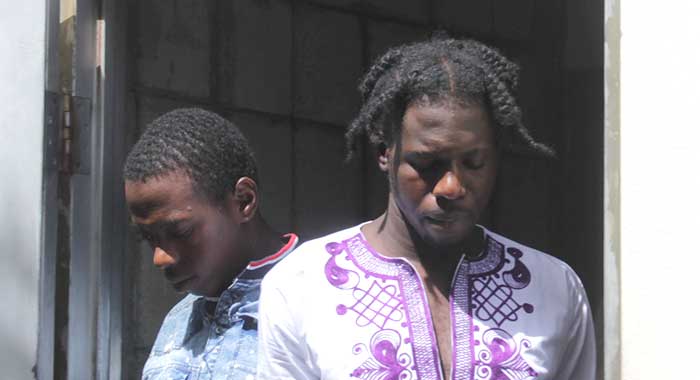Chief Magistrate Rechanne Browne, on Monday, urged two men against whom a murder charge was withdrawn to take stock of their lives.
Lebert King, 26, of Choppins and Rocaldo McMaster, 27, of Harmony Hall, were facing a preliminary inquiry in the July 2020 murder of Grenadian Dwane Seaton in the Baleine Mountain.
When the matter was called, prosecutor Sergeant of Police Renrick Cato told the court that counsel Israel Bruce was representing the accused men, who are both farmers.
The prosecutor said that he had spoken to Bruce that morning and he had indicated that he was leaving the country that day and would be out of state for a month.
Cato asked the court to have the matter stood down so he could take instruction from his superiors.
When the matter was recalled, Cato made an application under Section 68 of the criminal court that the matter be withdrawn.
Section 68 of the Criminal Code gives a prosecutor, acting on behalf of the director of public prosecution, the power to withdraw any matter at any stage of the proceedings.
On hearing the prosecutor’s submission, the chief magistrate told the men that the matter against them was withdrawn.
Browne, however, told them that the last time they were before her court she had indicated “some things … based on my observation of your behaviour just being over there” – a reference to the prisoners’ seating area.
“And that behaviour says a lot. This trial was not completed but I warned you and cautioned you based on what I saw. It didn’t reflect a good attitude,” the chief magistrate said, pointing out that an accused person is innocent until proven guilty.
“You are young, from Choppins and Harmony Hall but because you found yourselves in Baleine Mountain, way from where you are from, you were brought up on a charge.
“Take stock of your lives. Free to go,” the chief magistrate said.
The men are alleged to have brought the bullet-riddled body of Seaton from Baleine Mountain to Baleine Bay where police met it on July 8, 2020.
Seaton, a 40-year-old farmer of Grenada, and Edinboro and Owia in St. Vincent, was killed at Baleine Mountain between July 6 and 9, 2020, police say.
Detective Corporal Dwight James of the Major Crime Unit is leading the investigation.







From a legal pefspective charges withdrawn is not equivalent to being innocent of the crime . It simple means there is insufficient evidence to charge the accuse with the crime beyond a reasonable doubt.
If they did not have enough evidence why charge them in the first place, do your investigation to a point where the evidence is over whelm then CHARGE, this is how they WASTE TAXPAYERS MONEY, and make a fool of themselves
This is not justice. What if these men really killed the decease? How can you protect a country and it’s people against criminals with these types of decisions?
The judiciary needs to take stock of itself. Why are we still having preliminary inquiry and not paper committal. This is a waste of the police time. The prosecution needs to provide an explanation to the people why the case was withdrawn.
The Police Force is poorly trained and equipped to deal with crime. Very intelligent Officers but they are not trained to the very best standards because they poorly resourced and funded. Such a waste of talent and unfairness to tax payers.
There are three things that make a good and effective Police Force. Being well equipped, highly trained and excellently led.
PACE Code A: deals with the exercise by police officers of statutory powers to search a person or a vehicle without first making an arrest. It also deals with the need for a police officer to make a record of such a stop or encounter.
PACE Code B: deals with police powers to search premises and to seize and retain property found on premises and persons.
PACE Code C: sets out the requirements for the detention, treatment and questioning of people in police custody by police officers. It replaced the Judges’ Rules in England and Wales.
PACE Code D: concerns the main methods used by the police to identify people in connection with the investigation of offences and the keeping of accurate and reliable criminal records.
PACE Code E: deals with the tape recording of interviews with suspects in the police station.
PACE Code F: deals with the visual recording with sound of interviews with suspects.
PACE Code G: deals with statutory powers of arrest.
This could only happen in movies and SVG. SVG Police only good for beating up women and children.
It is sad that there will be no justice for the Grenadian who was killed. […]